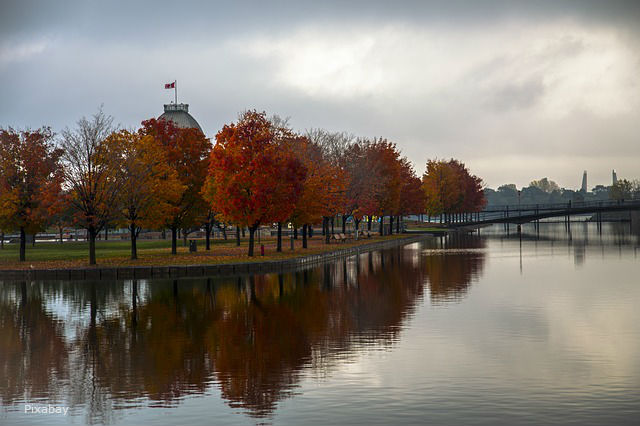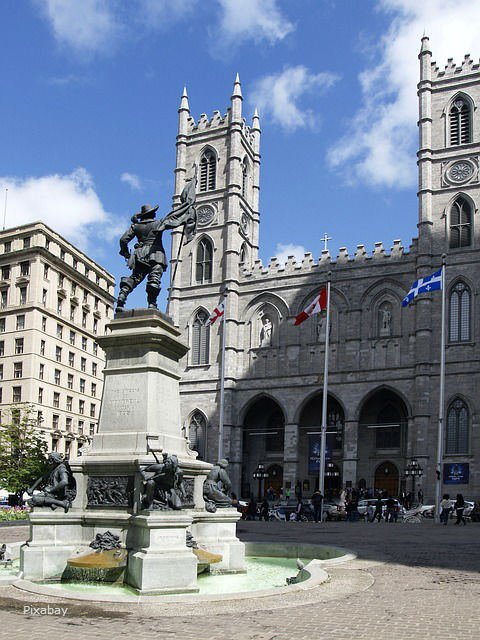|
A city known for being a cultural capital, the heart of Montreal has a unique blend of Old World tradition and architecture with innovative urban design.
Montreal is Canada’s second largest city and is the biggest in the French province of Quebec. It gets its name from Mount Royal, its distinct three peaked mountain that is at the heart of the city. It is located on the Island of Montreal, but the city also includes some smaller satellite islands. The greater Montreal metropolitan area covers much more space than just the islands. This inland location on the river-way that connects the Great Lakes to the Atlantic is one of Canada’s most busy and important ports.
It is the second only to Paris as the largest city in the world where French is the primary language. Fifty-seven percent of the population speaks French, the official language, but there is also a large population of bilingual speakers who know English, as well. Fifty-six percent of the population is able to speak some English in addition to French.
Montreal is a great city with a lot of unique features. If you are planning a move to Montreal, you need to know about everything it has to offer before you can decide if it is right for you.
Montreal’s Climate
Montreal is located near the southwestern edge of Quebec. This relatively southern location gives it a humid continental climate designation according to the Koppen Climate Classification system. This means that Montreal is relatively humid and warm in the summer, despite being quite cold during the other seasons. The average temperature in July is just above 22°C, which isn’t hot, but it is warm compared to other Canadian locations. It can get highs approaching 27ºC, regularly.
Winters are snowy and icy in Quebec. Snow is commonly on the ground between November and March. January is the coldest month with an average daily temperature of -9ºC.
Falls and springs are milder by comparison, but can see severe temperature fluctuations. There can be late warm fronts in fall, but also early snowstorms. April is generally tranquil but May often experiences thunderstorms.
There is a fair amount of precipitation in Montreal--980 mm of rain and snow falls in an average year, including about 225 mm of snowfall.
Neighbourhoods
Montreal has several diverse neighbourhoods. There are 19 large boroughs that make up Montreal. These boroughs used to be independent cities until 2002 when they were incorporated into Montreal. Not surprisingly, many of these boroughs maintain distinct identities from each other. However, these boroughs can be further divided into smaller neighbourhoods. The most notable neighbourhood  s are downtown, Old Montreal, and Mount Royal. Old Montreal is a historic area filled with cobblestone pavement and a variety of tourist attractions. It even has horse drawn carriages! The Old Port of Montreal was historically the major hub of the city, but the active port of Montreal was moved eastward towards the downtown area. The old port is currently maintained as a national park.
Downtown is the more active, modern part of the city. You can find business and entertainment most easily by going downtown. The current Port of Montreal acts a commercial hub for the area. Only relatively wealthy residents can afford to live in the downtown neighbourhood.
Mount Royal is a more rural part of the city. The Mount Royal Park is one of Canada’s largest greenspaces. Mount Royal is also notable for housing two cemeteries. Mount Royal Cemetery contains the remains of notable Canadians while Notre Dame des Neiges Cemetery is a Catholic French cemetery that houses a larger number of French Canadians.
There are some neighbourhoods defined by the ethnicity of the residents, as is common in most big cities. There is a Chinatown despite a relatively small population (2.9 percent) of Chinese people in the city. Quebec is primarily European, but there is a growing number of visible minorities in the city. Roman Catholic is the most common religion, but again, there are pocket neighbourhoods that show great cultural diversity in religion and all other aspects of culture.
The crime rates in Montreal are relatively low for a large city. However, there is a great distrust in the government. Citizens are most concerned with corruption. According to crime calculation site, numbeo, Montreal’s crime index is 36.8, which is above average. When crime does occur it is usually property theft and rarely violent crime. Registering Your Car
Quebec’s government operates independently from the rest of Canada, so registering your car in Montreal may not be as simple as it is elsewhere. Contact Quebec’s government office for vehicle regulations, the SAAQ, to see what is necessary. If you are attempting to register a luxury car, a car that is over 25 years old, or a car that has high cylinder capacity, expect to pay additional fees.
Generally, Quebec allows you six months to drive with a license from a foreign jurisdiction before you must get a Quebec license.
Employment
Montreal has the second most productive economy in Canada behind Toronto. The Port of Montreal is one of the largest inland ports in the world. Montreal also is home to the Montreal Stock exchange and is a leader in many industries. Aerospace, pharmaceuticals, software, telecommunications, textile manufacturing, and electronic goods all have robust industries in the city.
The Port of Montreal drives a lot of the commerce for both Montreal and in Canada in general. It is especially an important port for grain, sugar, machinery, petroleum, and consumer products.
Montreal has an impressive average unemployment rate of 7.5 percent. Its labour force of 2.2 million exceeds the population of the city proper. Despite having a relatively low rate of unemployment, Montreal has a reputation for having a very competitive job market. Former residents have complained of employers using exclusionary tactics towards outsiders and frequent underemployment.
Montreal’s Cost of Living
Montreal ranks high on most livability scales, yet it remains a big city with the accompanying high costs that that entails. It is notable for having very high taxes.
You can get by with $2,000 a month after taxes if you live alone in Montreal. A family of four would need $5,000. Rent is relatively low ranging from $500 to $1,500. Downtown housing is the most expensive. Groceries, utilities, and public transportation all are relatively inexpensive. However, taxation takes almost half of your income and sales tax is at 17 percent.
Healthcare is free, but it often is too crowded to be relied upon. There are private clinics where you will get quick emergency service, but you will have to pay.
Transportation
Montreal has a bad reputation for its traffic. Not only are the roads congested, but there seems to be constant construction and abundant pot-holes. A major problem is the width of the Saint Lawrence River. Bridges or tunnels across the river are expensive and difficult to construct. There are only four bridges, one tunnel, and one metro line that crosses the river.
Public transportation is a must for commuters in Montreal. The STM bus network serves an average of over 1.3 million people each weekday. Despite the high volume of passengers, in 2010 the STM won an award for Outstanding Public Transit System in North America given by the APTA.
The Montreal Metro subway system is the busiest in Canada. It serves over 1.05 million passengers daily. The commuter line is managed by the Metropolitan Agency of Transport and has six lines that reach the outlying areas of the Montreal metropolitan area.
Montreal Schools
Montreal is known for being a great city for education. It has four universities, seven degree-awarding institutions, and 12 publicly funded colleges. It has the highest concentration of post-secondary schools in a major North American city. 4.38 out of every 100 residents are students in Montreal.
The University of Montreal is the second largest university in Canada and is considered one of the best business schools in the country. McGill University is one of Montreal’s two English-speaking universities and is recognized as a top University worldwide. It has been considered the best University in Canada for nine straight years.
Public Elementary and secondary schools are run by the English Montreal School Board and the Lester B Person School Board for English speaking schools. French public schools are run by the Commission scolaire de Montreal, the Commission scolaire Marguerite-Bourgeoys, and the Commission scolaire Pointe-de-I’lle.
Culture and Contemporary Life

Montreal has a unique cultural identity since French and English ideologies are combined. It is the centre for all French language media in Canada including television, radio, film, theater, and print publishing.
The city is also known for its many festivals, which are usually held in the downtown area. The largest one is the Just for Laughs festival, which is also the largest comedy festival in the world. Other events include the Montreal International Jazz Festival, Montreal world film Festival, Les Franco Foiles de Montreal, and the Montreal Fireworks Festival.
If festivals aren’t your thing, Montreal has other ways to keep you entertained. There are a lot of ethnic restaurants, clubs, beautiful churches, and museums for people of all ages. Don’t forget the Montreal Canadiens, a world class hockey team. The Canadiens are part of the NHL’s revered “Original Six” but the team actual predates the National Hockey League. That’s a team with some history!
One negative about Montreal’s culture that former residents occasionally bring up is that the people of Quebec are relatively isolationist compared to other Canadian cities. Many tourists have expressed frustration with the closed attitude of native Quebecers who sometimes are suspicious of outsiders.
Moving Resources
Have you decided that Montreal is right for you? The following links will let you contact moving companies that can move you into or within Montreal. Remember to get many quotes from multiple companies to find a fair price.
Relocation Tips
- Make sure you review all the information on the Quebec government before moving there from a different province or another country. Quebec operates quite differently from the rest of Canada.
- French may be the official language, but most French speakers in Montreal are bilingual.
- French is spoken differently in Quebec than it is in France. Be sure to learn the right type of French for the area.
- Be prepared to pay high taxes.
- Use public transportation. It is relatively cheap and traffic is notoriously bad in Montreal.
Helpful links
- Nubeo: A cost of living/crime rate calculator for Montreal.
- SAAQ: Register your car in Montreal using this Quebec governmental website.
- Tourisme Montreal: A website that shows all of the tourist options for those visiting the city.
- Montreal Gazette: Montreal’s biggest English Language newspaper.
- Montreal Canadiens: The official website of the most popular sports team in Montreal.
- English Montreal School Board: Register your children in Montreal’s public school system for English speakers.
|